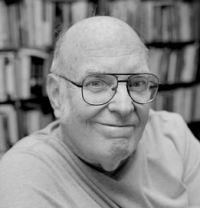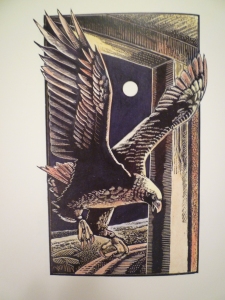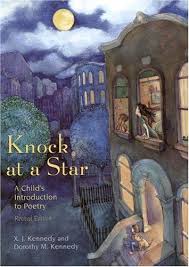Every day a poem comes into my e-mail inbox from The Poetry Foundation. Even this solitary Poem-a-Day is often too much for me to handle, and I either let my supply build up for days and/or I delete some poems after a brief scan. But on the occasional day I take the bait and end up reading several poems and stories about the poets.
A couple of months ago there was a poem by X.J. Kennedy that got my attention, because although I knew his name from a poetry textbook I own, as he was co-editor with Dana Gioia of that book, I hadn’t seen any of his own poetry before. I was predisposed to like him because of his collaboration with Dana Gioia whom I greatly admire (As you will see if you check out tags with his name here on my blog).
ago there was a poem by X.J. Kennedy that got my attention, because although I knew his name from a poetry textbook I own, as he was co-editor with Dana Gioia of that book, I hadn’t seen any of his own poetry before. I was predisposed to like him because of his collaboration with Dana Gioia whom I greatly admire (As you will see if you check out tags with his name here on my blog).
Kennedy was born in 1929 and wrote science fiction in his youth. His poem-writing seems to have come a little later, along with journalism work during the war, and teaching English. Here is a short poem from 1985:
You Touch Me
You touch me.
One by one
In each cell of my body
A hearth comes on.
When I read that he had been writing a lot of poetry for children in recent years, I borrowed several books by him from the library to investigate. A book of nonsense poems wasn’t my style, but The Beasts of Bethlehem is quite wonderful, with short poems from the perspective not just of the usual farm animals, but some critters less famous for being near the Christ Child, such as a beetle, a bat, a worm, and this:
HAWK
Before Christ , yesterday,
, yesterday,
From clouds I dived, gave chase,
And fed. But in this place
Of peace I shall not prey
On living things. Those six
Young hares ripped from their burrow
Were lovely, though. Tomorrow,
Old plump hen, watch your chicks.
As you can see, the animals not only think to themselves about the Event, but are in conversation with each other. Many also convey Kennedy’s sense of humor that is not without reverence. I have already bought three copies of this book so that I’ll be ready for next Christmas.
The Owlstone Crown is a novel Kennedy wrote for middle-schoolers, I think. It features children who accidentally fall into an alternate world where they help to rescue their relatives from slave labor. I was first off charmed by the presence of a talking ladybug, but it turned out to be a man ladybug who was a wisecracking tough character, and I didn’t like him much even though he was the type who has a good heart. I did see the book through to the end, but can’t imagine anyone to whom I couldn’t recommend some much better story.
My favorite discovery from X.J. Kennedy (if you Google him you can find out how and why he got those initials) I have kept for last. It is his Child’s Introduction to Poetry titled Knock at a Star. I wish I could have read the whole thing with my children, but it was published a little late for most of them, in 1999. So I bought a few copies for grandchildren who are at the right age right now, or will eventually be.
The first section of the book is “What Do Poems Do?” and the answers are Make You Smile, Tell Stories, Send Messages, Share Feelings, Help You Understand People, and Start You Wondering. Each of those chapters includes ten or more poems, many by well-known poets and not specifically for children, which I appreciated. Too often I’ve seen collections that were so dumbed-down as to be insulting, and not a good kind of literary food for inculcating good taste.
Even the humorous poems include “Termite” by Ogden Nash. This one from the Understanding People section is by Valerie Worth
My Mother
My mother
Wasn’t like
Some others.
She didn’t
Make cakes or
Candied apples.
She sat down
Beside her
Sewing basket
And stayed
Up late
Reading poetry.
In Section 2 the question “What’s Inside a Poem?” is answered. Here a poem by Wallace Stevens illustrates that Images may be inside. And Word Music is shown through this poem by Emanuel diPasquale, “Rain”:
Like a drummer’s brush,
the rain hushes the surfaces of tin porches.
Beats That Repeat are found in one of my favorite “Opposites” poems by Richard Wilbur, and in others by Robert Frost and Gertrude Stein. The descriptions of poetic technique are brief and helpful, so we can move on quickly to the poems themselves.
There are limericks, of course, and songs (“Blowin’ in the Wind” by Bob Dylan) and haiku. And a last section on writing your own poems. I just think this book has everything for the child of eight or ten and older, and if I’d read something like this when I was young I’d be even more like that mother in the poem. I wonder just how late she stayed up?
That’s a funny story about his name — I’d always assumed it stood for Xavier, and by “always” I mean since I was in college. We used his 1976 introduction to literature as a text and I liked it so much I kept it and still refer to it. Several of my favorite poems came from that book.
That child’s introduction really does sound good. I might have to add it to my wish list.
LikeLiked by 1 person
When literary books for children are good, they are very good..even for us grown-ups. And now I feel younger just from all you’ve taught me this morn! Maybe I will see or hear or taste or squeeze a poem this day.
LikeLiked by 1 person
One of the things that I love about blogging is that I’ve rekindled my interest in poetry. A lot of the blogs I find myself drawn to are by aspiring poets.
Great post and I’m so happy you stopped by to say hello!
xxoo,
RMW
LikeLiked by 1 person
I’ve got a shelf of poetry books that I still love. Like you, I don’t like the dumbed down poetry for kids, but the real stuff that makes all people smile and continue reading. Good stuff here!
LikeLiked by 1 person
What a delightful post, GJ! I enjoy the poems you post here so much, every time you do. Like you, a new poem each day would glut me quickly. I love to savor them. Perhaps one each week would be a better diet? Hmm.
I do like the sound of that book of poems for children. So many of those poets you mention I already enjoy. I’ll keep that in mind, even if just for me. Children should read good poetry, early on.
LikeLiked by 1 person
I have liked what I have come across by X. J. Kennedy before, and this makes me like him even better. Poetry anthologies are both a delight and a problem – I have a fair share now, and like the idea of the one you recommend, but with shelf space at a premium, I hesitate to buy more books similar to what I already have. But I love that poem about the mother … If I were still home schooling, I would use school as an excuse to buy another text!
LikeLiked by 1 person
Kennedy sounds like a poet after my own heart. I will definitely look him up.
LikeLiked by 1 person
The hot centeredness of “hearth” has some nice associations in art available to the “folk”: the center square of a log-cabin quilt block is called the hearth; and (best you find the right wording) Basho’s definition of poetry parallels the poetic logic behind “a fan in winter and a fireplace in summer.”
The other XJK poem–recalls to me the sound of a rabbit on a wooded hillside in Iowa City in the middle of the night: an owl had no second thoughts about making it his or her own. If you’ve heard the rabbit’s sound, you will never forget it.
LikeLiked by 1 person